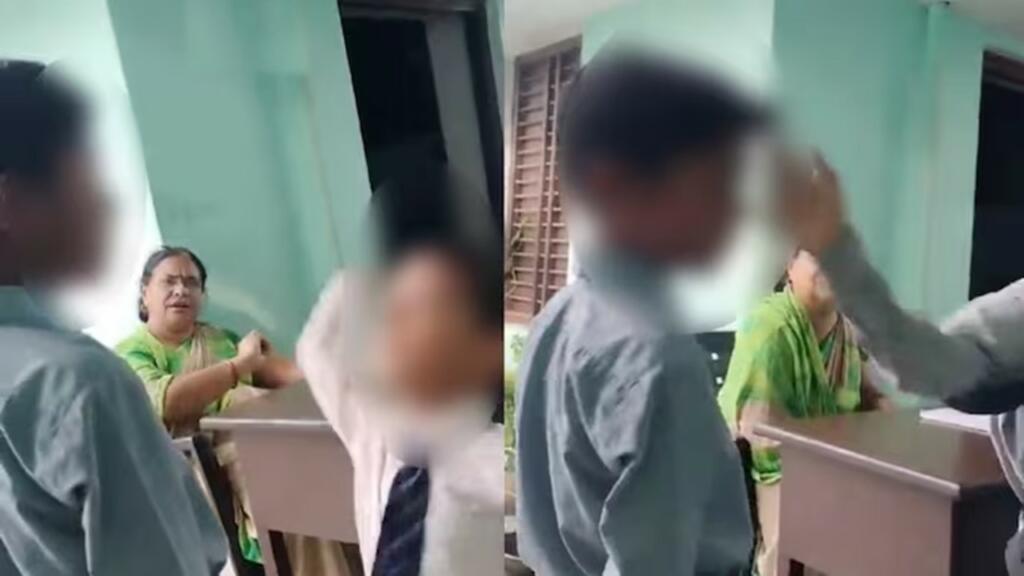The Muzaffarnagar incident has jolted the nation, sparking widespread discussions. In a video that swiftly went viral, a schoolteacher urged her students to slap a boy. This single act ignited a firestorm of reactions. Many left-leaning individuals cried foul, while a faction called for the immediate arrest of the teacher in question, Tripta Tyagi. Yet, the reality of the situation diverges significantly from the initial uproar.
The viral video capturing a schoolteacher urging students to slap a boy ignited a wave of reactions and controversies. Many left-leaning figures, including Mohammad Zubair and Simi Garewal, hinted at taking matters into their own hands. Yet, as the case unfolded, it became evident that this incident resembled the Loni case—a flurry of noise without substance.
The Muzaffarnagar Police quickly dismissed any communal aspect of the incident. They clarified that appropriate actions would be taken against the accused teacher, Tripta Tyagi, owner of Neha Public School, though the incident held no communal undertones. Khatauli Circle Officer, Dr. Ravi Shankar, stated that they were trying to convince the victim’s father to file a complaint before proceeding with a formal FIR and legal measures.
https://twitter.com/muzafarnagarpol/status/1695102804551934221
Muzaffarnagar incident, jolted nation, widespread discussions, viral video, schoolteacher, left-leaning individuals, immediate arrest, Tripta Tyagi, reality diverges, uproar, capturing attention, controversies, Mohammad Zubair, Simi Garewal, Loni case, noise without substance.
This hate monger @Simi_Garewal has deleted her post where she was asking for a Talibani Justice.@Uppolice Kindly take action against her. pic.twitter.com/bEE1QDpng4
— Shashank Shekhar Jha (@shashank_ssj) August 26, 2023
Interestingly, the father of the boy in the video came forward to deny any religious or communal angle. He affirmed that the incident had been wrongly depicted by the Islamo-leftist group on social media to stir communal discord. Nadeem, the cousin who recorded the video, echoed the same sentiment. He clarified that the teacher had instructed other students to discipline his cousin but emphasized that the video was edited to sensationalize the situation.
Nadeem emphasized that the teacher’s statement had been twisted, claiming she merely pointed out that Muslim mothers often took their children to relatives’ houses during exams, affecting their studies. He stressed that the teacher never made any anti-Muslim remarks.
This guy Nadeem is the cousin of that kid & the same guy who recorded the video.
He's saying that the teacher didn't pass any anti MusIim comment & she was complaining about Muslim women who don't care about their children's studies.Share this video max! pic.twitter.com/9h5ThtsZhC
— Mr Sinha (Modi's family) (@MrSinha_) August 26, 2023
Tripta Tyagi, at the center of the controversy, admitted her mistake in instructing students to slap the boy but maintained that the incident was being blown out of proportion. She clarified that her intentions were not malicious or communal and that the video had been edited to misconstrue her words. Tyagi explained that her remark aimed to highlight how students’ studies could suffer due to changes in their routines during exams.
This incident bears resemblance to earlier attempts by self-proclaimed intellectuals to amplify minor issues. The 2021 Loni incident is a notable example where a viral video suggested a Muslim man was coerced into chanting “Jai Shri Ram!”. The narrative was fueled by the then Twitter India and skewed interpretations. However, the UP Police thwarted these attempts, and even the judiciary rejected the narrative pushed by the so-called intellectuals, forcing some of them to issue an apology. This incident marked a turning point for Twitter, which was later taken over by Elon Musk.
The recent attempt to incite communal hatred in Muzaffarnagar is not an isolated occurrence. It follows a pattern that has played out before, exploiting small incidents to stoke divisions. This echoes the need for critical thinking and responsible sharing of information in a world influenced by the swift currents of social media.
Support TFI:
Support us to strengthen the ‘Right’ ideology of cultural nationalism by purchasing the best quality garments from TFI-STORE.COM
